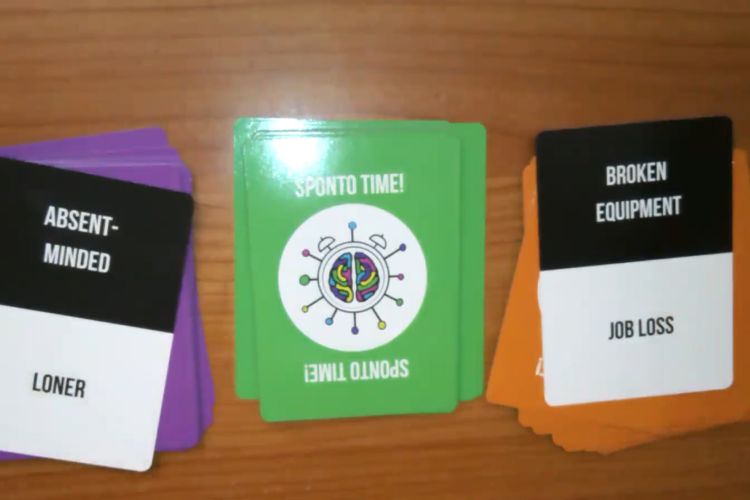Izzy G and Laura B use the Sponto Time deck to play the improv game “X is like Y.” After they both play the game, they debrief in an Applied Improv session.
Transcript:
Laura: So we’re going to play a game called X is like Y. And our top word here is absent minded. And our top word here is broken equipment.
Izzy: Both are missing pieces. Both are difficult to use when you’re trying to find a solution to a particular problem. And absent minded and broken equipment means that somebody has not been paying attention or taking care of what the pieces are. So the absent minded is like a distraction and the broken equipment is a distraction, because you’re going to use it. And then you can’t use it. Because it’s broken. So the two of them are, they’re alike in that they’re both very frustrating. They both promise something not delivered. And they both can be fixed by recognizing that we need an expert to help fix them.
Laura: I think we need to debrief that one right away.
Izzy: Yeah, let’s do it. Because absent mindedness will affect me right now!
Laura: (laughs) How did you feel in the lead up to starting that game? What emotions came up for you?
Izzy: Well, when the cards were being drawn, I had this anticipation of excitement about what’s it going to be? So I was trying to essentially, ground myself and recognize I couldn’t make any assumptions. Once the cards were turned over, I sort of spiraled in my head. What do I know about the broken equipment? What do I know about being absent minded? And I think that one of the things we learned from improv is that you as soon as you make some kind of connection, you try it. And that’s why my discussion was really. Every time I had more sort of made a connection, I would build on it, and expand on it. But I think what I what I learned from this is, is not to try to find the best, the only, the perfect. It’s sort of like spin the ideas around and see what comes up. Sort of below the level of awareness.
Laura: What I noticed for you and tell me if this is what happened with you or not, is you started, you started by talking. And you started sort of slow, but then you worked up momentum with it. Because your mouth was helping you think. You were talking your way through it. And the more you talk your way through it, the more your brain started to pick up steam and go “Oh, yeah. Now here’s another thing. And here’s another thing. And here’s another thing.”
Izzy: that’s the creativity innovation piece, this skill that improv teaches you. 💡Don’t wait till you have the right answer, step forward to take action, start moving, make something happen. 💡 And you have the ability to build on that the innovation piece is building on what you have towards a goal, not necessarily thinking in advance what the perfect answer is. And that’s why the narrative came out. And I’m just recognizing it as we’re talking that it’s really key to make those spins. And once you get to any kind of connection, start talking because it will come out eventually.
Laura: I do the same thing. When I work with writers who are experiencing writer’s block. It’s “your ideas aren’t fully formed, you write your way through them.” And it’s in this practice, your ideas aren’t fully formed, you talk your way through them.
Izzy: Yep. When in doubt, do something is what improv has taught me. 💡 Take, take an action, move your body say something, make any kind of connection and build from that. It’s really a creative exercise. 💡And why don’t you try it?
Laura: Oh, gee, okay. All right, what I am going to do, I am going to pick two orange cards just for fun. Okay, see, one is running late running late. And the other is a failed test.
Izzy: So Laura, how is running late like a failed test?
Laura: I can fail a test because I am running late. When I showed up too late to a test, I didn’t have time to finish it. And that’s what led me to fail. Failing a test can make me conversely, run late for something else because I’m depressed about failing the test. So I’m moving slower, and I’m trying to do things to make myself happier. Maybe I’m engaging in activities that aren’t very helpful. They’re just self-soothing behaviors, and then I end up procrastinating or becoming late. So that’s another way that running late and a failed test is like, and failed test is like running late in one other key way. When I fail a test, I will run late. Because I don’t know what I’m doing anymore. And I’m just running around in circles. And when you’re running around in circles, you’re going to run late.
Izzy: Nice. So how was that for you?
Laura: That was, I instantly gravitated to my first idea was, “oh, boy! I ran late because I failed the test because I ran late.” That seems really self-evident. So this was the opposite of you, right? You started out slow and going, “oh, boy, where do I go for this?” But I had that. And then I lost momentum. I figured I’m going to switch things around to come up with my second idea. And that I didn’t have any idea it was going to come out of my mouth. But I said, Oh, “I’m going to do self-soothing behavior, because I feel bad.” Okay, that works. And I’m like, I gotta come up with something else. And I’m just going to go confidently and say, “and this leads to one more key thing”. And I had zero idea what I was going to say after I said that, so I just whiffed it.
Izzy: Yeah, well, are you done with with your analysis?
Laura: Yeah.
Izzy: So you really focused well on this improv concept of, 💡 when in doubt, just keep moving the story forwards, many things are possible, not everything will work. 💡 In this case, there was a connection. What I noticed early on, was that your brain took the connection to a whole different level where it wasn’t so much as how is being late connected to failing, the test is that there’s a cause and effect. So it wasn’t that one was like another in a way that that you can compare them. But one was like another in that they had a cause and effect with each other. So you hooked them together creatively, instead of hooking them separately. Yeah, I thought that was an interesting choice, where it made sense because yeah, they aren’t connected. You running late, if you don’t do well on the test, you know. So I thought that was interesting to see that we can not only think linearly, but we can think in different ways that our mind works and different perspectives.
Laura: So it’s, for that one was more lateral thinking than linear thinking. And I think that’s fine to do, if you’re doing an X is like Y or Y is like X, that I flipped it around. Because the second one was causal is well that I would be running late for things because I consider myself a failure. And once you start doing negative self-talk, you start self soothing behavior that can cause to you become late.
Izzy: So, in our discussion, what I’m picking up on X is like Y is that when you fail a test or you are running late you are they’re both disappointing, and that they both fail to meet some standard either your standard or someone else’s standard. So they are a judgment status similarity that they both are results of not being the best you can be or expected to be at that time.
Laura: You know, I wish I would have closed with that one!
Izzy: Well, that’s why we’re a team! What I think this points out, is is that the discussion part of Sponto Time, the debrief part, is fun. And by doing it alone, or with other people, getting to process our thoughts and our creativity is not something that people usually do. So this is I think one of the value adds for our game. And our process is that you get to look at how your creative mind works. 💡And working together, we can help each other recognize how creative we are. 💡

